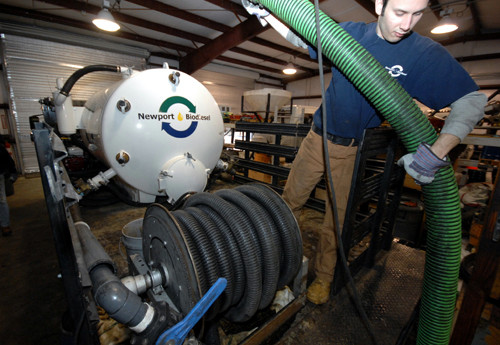
Call it getting tough on grease. Starting Jan. 1, Rhode Island law will require restaurants to send their used grease to recyclers.
State and local regulations already forbid eateries from sending the grease to sewers, where it can congeal and clog pipes. But the law, signed by the governor in July, now mandates that restaurants recycle, rather than toss, the cooking oil.
In reality, the law may have little effect. Many restaurants already ship their spent cooking oil to recyclers, Rhode Island Hospitality Association President and CEO Dale Venturini said. And the law assigns no agency to monitor compliance and spells out no penalties for businesses that flout the law.
Rep. Brian Patrick Kennedy, D-Hopkinton, the legislation’s chief sponsor, said he decided against assigning the R.I. Department of Environmental Management the enforcement responsibility after the agency said it lacked the staff and fiscal resources.
But Kennedy and other supporters of the law say it sends a strong signal to businesses that the state is serious about protecting its sewers, reducing waste in the landfill and encouraging the conversion of grease to biofuel.
“I think generally speaking, people recognize it is a good thing for the state,” he said.
Kennedy also said restaurants have plenty of ways to comply at no cost to them. The value of spent cooking oil has blossomed as demand for biofuel has mushroomed. In Rhode Island, Newport Biodiesel counts about 1,000 customers and is looking to expand its Newport plant. Smaller competitors are also competing for a share of the grease, which has become so valuable that Newport Biodiesel reports poachers are taking bins of grease awaiting pickup.
“There are going to be so many companies vying to remove it from them free of charge, that should be enough incentive for companies to do the right thing,” Kennedy said.
For many, the law means simply continuing current practice.
“It’s kind of something that’s already been happening for a few years now,” said David Johnson, executive chef at Providence restaurant Local 121.
Johnson said grease-removal companies are chomping at the bit for the restaurant’s business, now picked up by a local company.
The law, though, is not expected to create a mini economic boon for recyclers. Newport Biodiesel partner Chris Benzak said the Rhode Island market is already saturated. Still, the company supports the law.
“It’s getting people to think about this product as a resource,” he said.
It’s a resource that can directly impact the bottom line. A decade ago, Branden Read paid $160 a month to dispose of the grease at Celestial Café, a restaurant he co-owns in Exeter. Today, Newport Biodiesel picks up the 10 to 20 gallons a week for free and even provides the containers to hold the sticky substance. For larger restaurants, Newport Biodiesel will pay for the grease.
Grease traps and bins collect the grease, which then is typically put in bins behind the building to await removal.
“It’s a very easy thing,” Read said. “It’s a phone call away.”
The mandate came at the urging of a group of Westerly middle school students under the guidance of the Westerly Innovations Network junior team. Students testified at the Statehouse and even met President Barack Obama at the White House.
“The students know that in the whole process their voice can be heard,” said Jason Lin, the students’ coordinator. •












